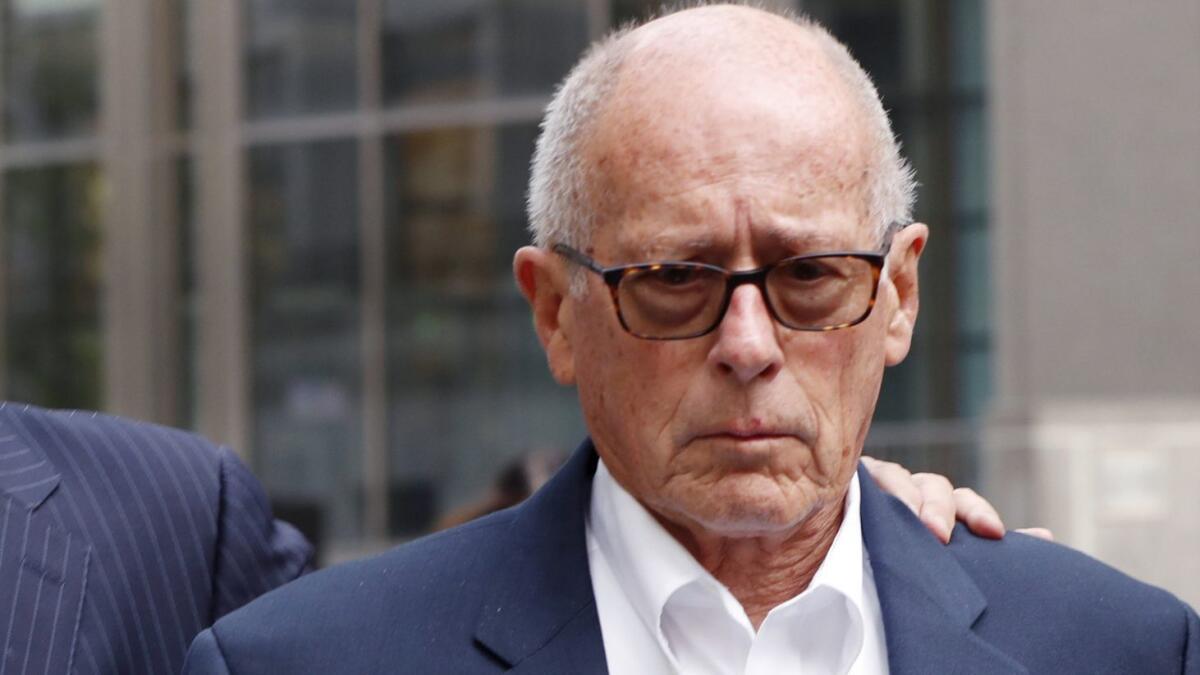Drug executives are criminally charged in major opioid case

- Share via
Federal prosecutors Tuesday unveiled the first criminal charges against pharmaceutical executives that accuse them of illegally diverting opioids. The former chief executive and the head of compliance at a major U.S. drug distributor are accused of a narcotics conspiracy.
Laurence F. Doud III, who spent 25 years as CEO of Rochester Drug Cooperative, and William Pietruszewski orchestrated a scheme to distribute high volumes of Oxycodone, fentanyl and other highly addictive opioids to pharmacies knowing the drugs would be sold to people who had no medical need for them, prosecutors said. Doud, 75, and other executives pressed ahead with the sales to increase revenue and boost their salaries, the prosecutors said.
“Why did they do it? The answer is greed,” U.S. Atty. Geoffrey Berman said at a press conference in New York.
Pietruszewski pleaded guilty Friday and agreed to cooperate with prosecutors, according to court records. The company, which bills itself as the nation’s seventh-largest drug distributor, is criminally charged with a narcotics conspiracy. It will pay a $20-million penalty, and prosecutors agreed to dismiss the case after five years if the company stays out of trouble.
Doud pleaded not guilty Tuesday at a hearing in New York. He was released on $500,000 bond.
“Mr. Doud is being framed,” his lawyer Robert Gottlieb said in a statement. “The government just got it wrong.”
The issue of opioids is a major problem in the country and Doud takes it seriously, Gottlieb said. But, he said, the government is being manipulated by people who had done wrong and are hoping to hide their misdeeds.
“Mr. Doud will not serve as their scapegoat,” Gottlieb said. “He will fight this with his last breath.”
The case is not the first against an opioid-company executive. Insys Therapeutics founder and ex-CEO John Kapoor is awaiting a Boston jury’s verdict on charges alleging he oversaw a scheme to bribe doctors to boost sales of the company’s top-selling opioid painkiller.
New charges
Officials said the new charges were a major step in the U.S. crackdown on those who have fueled the nation’s prescription-opioid epidemic, which has prompted a 33% surge in overdose deaths in the 10 years leading up to 2017, at a rate of more than 17,000 annually, according to the Centers for Disease Control and prevention. Still, Berman faced questions about why the company was allowed to enter a deferred-prosecution agreement rather than being required to plead guilty.
“We believed RDC could be reformed,” Berman said, adding that the company has undertaken a management overhaul and new compliance program. He said a guilty plea could have risked licenses that may have forced the company out of businesses, causing hundreds of employees to lose their jobs.
The privately held company based in Rochester, N.Y., buys pharmaceuticals from manufacturers and sells them to retail pharmacies. It covers 10 states in the northeast from Maine to Pennsylvania and has more than $1 billion in annual revenue.
In a statement posted on its website, the company said that its “mistakes” were directed by former management. “We can do better, we are doing better and we will do better,” it said.
Cash payments
According to prosecutors, company officials failed to alert the Drug Enforcement Administration to suspicious orders, as required by law. They ignored the high percentage of cash payments for prescriptions at certain pharmacies, orders for out-of-state patients and prescriptions issued by doctors acting outside the scope of their medical practice, prosecutors said. Authorities said the company often did business with pharmacies that had been blacklisted by other distributors.
From 2012 to 2016, RDC’s sales of Oxycodone increased 800% and sales of fentanyl rose 2,000%, prosecutors said. Compensation for Doud more than doubled to more than $1.5 million in 2016, they said.
The executives ordered the compliance department not to report suspicions of abuse about the pharmacies to authorities because they knew it would result in the customers being investigated and shut down, prosecutors said. They said that of 8,300 orders flagged by the company as potentially suspicious, the company reported four to the DEA for investigation.
Compliance and sales staff repeatedly warned top executives, at one point describing high-volume purchases as “a stick of dynamite waiting for the DEA to light the fuse,” according to an email cited in court documents.
“If the pharmacies were dynamite, then what was RDC? A warehouse of dynamite,” Ray Donovan, special agent in charge of the DEA’s New York office, said at the press conference.
Scapegoat claim
Doud has sued RDC, claiming he was forced out last year and became a scapegoat for the company’s mishandling of opioid painkillers. He said he was falsely accused of taking kickbacks in an effort to tarnish his reputation.
Along with the criminal charges, RDC faces lawsuits by dozens of New York counties accusing the company of helping to fuel a public-health crisis. The company has been named in a federal suit filed by cities and counties across the U.S. targeting makers’ and distributors’ handling of the painkillers.
In those cases, the local governments claim Purdue Pharma, Johnson & Johnson, McKesson Corp. and other opioid makers and distributors downplayed the painkillers’ health risks and oversold their benefits through hyper-aggressive marketing campaigns. The plaintiffs are seeking to recoup the costs of dealing with opioid addictions and overdoses.
The suits allege McKesson, Cardinal Health and other drug distributors contributed to the epidemic by failing to halt suspiciously large shipments of the painkillers. McKesson is accused of shipping 3 million pills to a single West Virginia pharmacy over a 10-month period. The store served a town with a population of 400 people.
More to Read
Inside the business of entertainment
The Wide Shot brings you news, analysis and insights on everything from streaming wars to production — and what it all means for the future.
You may occasionally receive promotional content from the Los Angeles Times.










